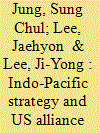| Srl | Item |
| 1 |
ID:
178700


|
|
|
|
|
| Summary/Abstract |
Will the US-led Indo-Pacific strategy lead to an extensive alliance network against China? This article shifts focus to non-Quad Asian states—in particular, Indonesia, Vietnam, and South Korea—that face a strategic dilemma in the US-China competition and examines their positions regarding a rising China and the Indo-Pacific strategy. While reluctant to join the US strategy for the Indo-Pacific region, Asian middle powers now aim to tame, rather than contain, China despite their slight variations of response to the Indo-Pacific strategy. The US and its three partners—Japan, India, and Australia—have not been successful yet in recruiting new members to their coalition, mainly because of the declining hegemon’s (seemingly) weakened commitment to a liberal international order and the rising challenger’s (potential) opposition and punishment.
|
|
|
|
|
|
|
|
|
|
|
|
|
|
|
|
| 2 |
ID:
191739


|
|
|
|
|
| Summary/Abstract |
Middle powers have been increasingly influential in world politics. Nevertheless, the study of international order pays little attention to their conceptions of order, and how they articulate these conceptions in world politics. This article focuses on Indonesia's conceptions of international order as an example of an emerging Asian middle power. It addresses two key questions: what is Indonesia's understanding of international order, and how has Indonesia engaged with liberal international order in the past twenty years? I argue that the foundation of Indonesia's conception of international order is premised on a desire to pursue autonomy in international politics. This vision was articulated by Vice President Mohammad Hatta and it has been maintained by different administrations. After its democratic reform in 1998, Indonesia began to articulate democracy as its preferred conception of international order. This was primarily demonstrated by two Indonesian presidents, Susilo Bambang Yudhoyono (2004–2014) and Joko Widodo (2014–present). On the one hand, Yudhoyono sought to ‘perform’ Indonesia's identity in the liberal international order as a home-grown democracy. Widodo, on the other hand, has been highlighting how material impacts of the liberal international order can deliver equitable development. By articulating democracy, both presidents have been able to constructively engage with the liberal international order.
|
|
|
|
|
|
|
|
|
|
|
|
|
|
|
|